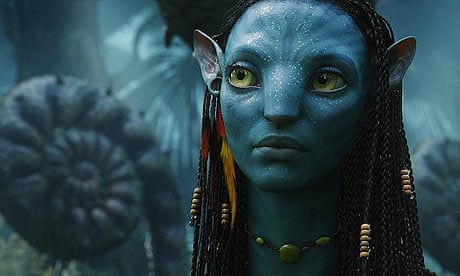It cost hundreds of millions of dollars. It was four years in the making. Its facial performance capture system alone took 18 months to perfect. In spite of gloomy prognostications, the end product looks staggering. Nonetheless, Avatar fails in one rather important respect. By common consent, its story's rubbish.
On the face of it, that's odd. Transforming 3D technology was presumably quite a task. Investing an anorexic, alien giantess with sex appeal must have been something of a challenge. Keeping Fox's bean-counters from expiring in panic can't have been easy. In comparison, getting a decent script should have been a doddle. LA's crawling with hotshot writers. Unlike almost everything else that this film required, they even come cheap.
Yet, instead of gorging on their services, James Cameron seems to have lifted Avatar's story from the movie-maker's trashcan. Even more tedious than the film's plot is the ideology enshrining it. In punctilious compliance with liberal pieties, an exploitative corporation unleashes brutish militarism on soulful indigenes, but a romance enables justice to prevail over apparently superior firepower. This threadbare fable makes you long to see a heroic merchant banker socking it to a tribe of tree-hugging but child-abusing primitives who're daring to challenge the rightful hegemony of capitalism.
So tired is Avatar's tale that you hardly notice it. The film is mere spectacle, about as emotionally engaging as the associated videogame. Perhaps the importance attached to this game tells us what Fox's bosses were up to. Maybe they reckoned that the digital-native audience has moved on from concern with motive, thought and feeling. Profuse and intense audiovisual experience outside the multiplex, they may have calculated, has conditioned today's young cinemagoers to desire and expect nothing more than fireworks.
Certainly, thinking like this seems pretty pervasive in Hollywood. In 2009, films such as Transformers: Revenge of the Fallen, Terminator Salvation and Fast & Furious have all seemed to reflect the assumption that emotional interaction is dispensable. Of course, movies like these do well at the box office, and so will Avatar. End of story? Not necessarily.
Whether cinema can live indefinitely by spectacle alone must be open to doubt. Dependence on shock and awe means that this year's sensation must be surpassed next year by something even more dumbfounding. Avatar demonstrates that this is still possible, yet it's not clear that it will always be. Before too long, a plateau may be reached. If that happens, those videogames may steal the crown of the movies that ape them. Once the thrill of novelty's faded, why just watch an avatar on the big screen when you can control one of your own?
Cinema will stand a better chance of holding on to an audience if it can persuade its young patrons to look beyond sensory stimulation. Storytelling doesn't have to displace the techniques that Cameron has so effectively enhanced. There's no obvious reason why good action and a good story shouldn't go together.
This clearly isn't impossible. Earlier this year, District 9 floated a scenario spookily similar to Avatar's. In Johannesburg as on Pandora, the human functionary of an oppressive corporation assumed the shape and then the outlook of its alien victims. There was even a climactic shootout. Otherwise, however, things were rather different.
As Avatar's avatar, Sam Worthington is a colourless dullard. Sharlto Copley's unreflective middle-manager, on the other hand, was a weirdly unforgettable human being. District 9's aliens weren't saintly innocents, but complicated and irritable, yet somehow endearing, full-blown characters. The film's plot was surprising, the dialogue witty and the moral instructive.
Since District 9's budget was only a tenth of Avatar's, newbie director Neill Blomkamp couldn't depend simply on surface gloss. So he went for narrative pith, and successfully delivered it. The burden of apparently limitless resources shouldn't prevent Cameron and his ilk from doing likewise.






Comments (…)
Sign in or create your Guardian account to join the discussion